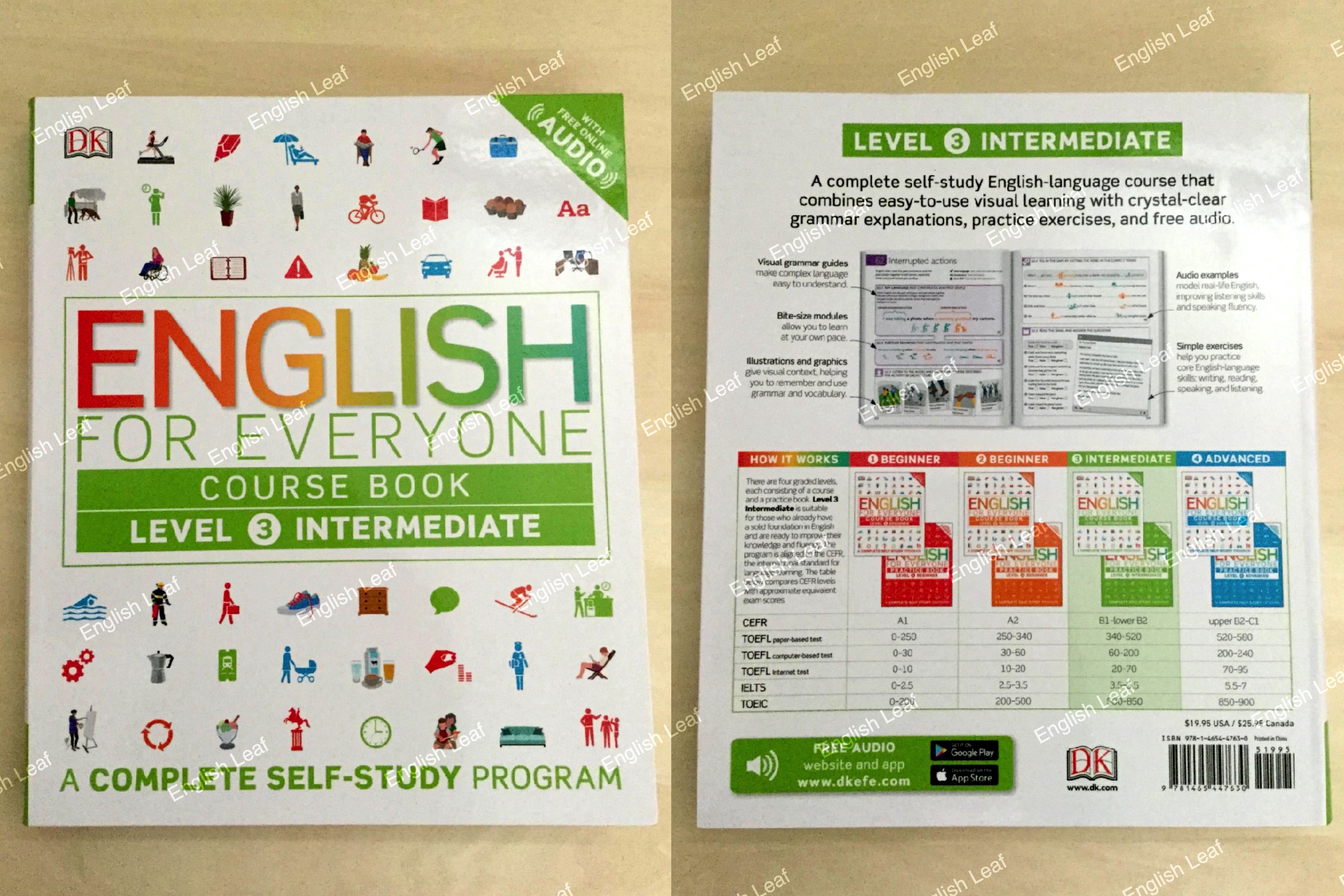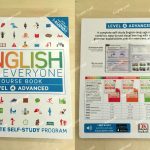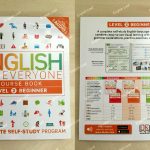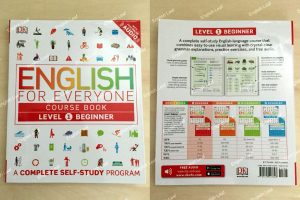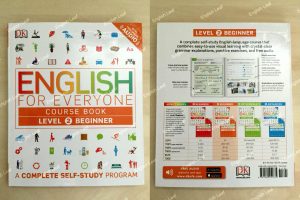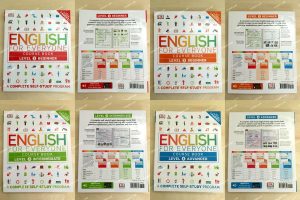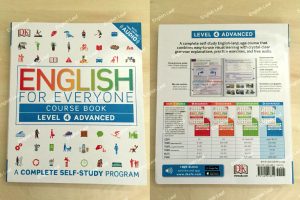英語は英語で学ぶ
「English for Level」シリーズのレベル3です。レベル1,2とは異なり、中級者向けです。TOEFL・TOEICなど主要の英語試験に必要な語彙や文法、演習がカバーされています。本書の文章は全て英語で書かれており、英語を英語で学ぶことによって新しい気づきを得られます。
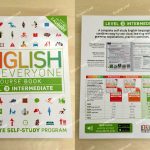
Author
Gill Johnson is an experienced English-language teacher, author, teacher-trainer, and conference speaker. She currently runs a large modern languages department at an international school in Sussex, UK, and spends her holidays training teachers worldwide.
Course consultant
Tim Bowen has taught English and trained teachers in more than 30 countries worldwide. He is the co-author of works on pronunciation teaching and language-teaching methodology, and author of numerous books for English-language teachers. He is currently a freelance materials writer, editor, and translator. He is a member of the Chartered Institute of Linguists.
Language consultant
Professor Susan Barduhn is an experienced English-language teacher, teacher trainer, and author, who has contributed to numerous publications. In addition to directing English-language courses in at least four different continents, she has been President of the International Association of Teachers of English as a Foreign Language, and an adviser to the British Council and the US State Department. She is currently a Professor at the School for International Training in Vermont, USA.
Penguin Random House
US Editors Allison Singer, Jenny Siklos
Editors Gareth Clark, Lisa Gillespie, Andrew Kerr-Jarrett
Art Editors Chrissy Barnard, Ray Bryant
Senior Art Editor Sharon Spencer
Editorial Assistants Jessica Cawthra, Sarah Edwards
Illustrators Edwood Burn, Denise Joos, Michael Parkin, Jemma Westing
Audio Producer Liz Hammond
Managing Editor Daniel Mills
Managing Art Editor Anna Hall
Project Manager Christine Stroyan
Jacket Designer Natalie Godwin
Jacket Editor Claire Gell
Jacket Design Development Manager Sophia MTT
Producer, Pre-Production Luca Frassinetti
Producer Mary Slater
Publisher Andrew Macintyre
Art Director Karen Self
Publishing Director Jonathan Metcalf
DK India
Jacket Designer Surabhi Wadhwa
Managing Jackets Editor Saloni Singh
Senior DTP Designer Harish Aggarwal
First American Edition, 2016 Published in the United States by DK Publishing 1450 Broadway, Suite 801, New York, NY 10018
Copyright © 2016 Dorling Kindersley Limited DK, a Division of Penguin Random House LLC 191098 026-284202-Jun/2016
All rights reserved. Without limiting the rights under the copyright reserved above, no part of this publication may be reproduced, stored in or introduced into a retrieval system, or transmitted, in any form, or by any means (electronic, mechanical, photocopying, recording, or otherwise), without the prior written permission of the copyright owner. Published in Great Britain by Dorling Kindersley Limited.
A catalog record for this book is available from the Library of Congress. ISBN 978-1-4654-4763-0
DK books are available at special discounts when purchased in bulk for sales promotions, premiums, fund-raising, or educational use. For details, contact: DK Publishing Special Markets, 1450 Broadway, Suite 801, New York, NY 10018
Special Sales@dk.com
Printed and bound in China
All images © Dorling Kindersley Limited For further information see: www.dkimages.com
A WORLD OF IDEAS: SEE ALL THERE IS TO KNOW
www.dk.com
Contents
How the course works
01 Making conversation
New language Question tags
Vocabulary Introductions and greetings
New skill Making conversation
02 Vocabulary Countries
03 Where things are
New language Prepositions of place
Vocabulary Countries and nationalities
New skill Talking about where things are
04 Numbers and statistics
New language Numbers in spoken English
Vocabulary Sports events
New skill Using numbers in conversation
05 Times and dates
New language Precise times
Vocabulary Dates in US and UK English
New skill Talking about times and dates
06 Contact details
New language Letters and numbers
Vocabulary Contact details
New skill Exchanging personal information
07 Talking about jobs
New language “Job” and “work”
Vocabulary Jobs and professions
New skill Talking about your career
08 Routine and free time
New language Adverbs of frequency
Vocabulary Leisure activities
New skill Talking about routines
09 Everyday activities
New language Phrasal verbs
Vocabulary Work and leisure
New skill Talking about everyday activities
10 Vocabulary Body and appearance
11 Describing people
New language Adjective order
Vocabulary Adjectives for describing people
New skill Describing people in detail
12 Vocabulary Clothes and accessories
13 What I’m wearing
New language The present continuous
Vocabulary Clothes and fashion
New skill Describing clothes
14 Vocabulary Rooms and furniture
15 Daily routines
New language Collocations
Vocabulary Routines and chores
New skill Talking about your day
16 Separable phrasal verbs
New language Separable phrasal verbs
Vocabulary Around town
New skill Describing a town in detail
17 Comparing places
New language Modifiers
Vocabulary Geographical terms
New skill Describing and comparing places
18 Likes and dislikes
New language Adjectives with “-ing” and “-ed”
Vocabulary Feelings and emotions
New skill Talking about likes and dislikes
19 Vocabulary Family and growing up
20 Early years
New language “Did” for emphasis
Vocabulary Baby equipment and parenting
New skill Describing your childhood
21 Vocabulary Education
22 Changing meaning
New language Prefixes and suffixes
Vocabulary Studying
New Skill Changing the meaning of words
23 Vocabulary Transportation and travel
24 Places I have been
New language Present perfect tense
Vocabulary Travel experiences
New skill Talking about the recent past
25 Things I have done
New language Modifying adverbs
Vocabulary Adventure sports
New skill Talking about your achievements
26 Activities in progress
New language Present perfect continuous
Vocabulary Home improvements
New skill Talking about activities in the past
27 My talents and skills
New language Present perfect continuous questions
Vocabulary Hobbies and interests
New skill Asking about past events
28 Activities and their results
New language Forms of the present perfect
Vocabulary State and action verbs
New skill Talking about results of activities
29 Everyday problems
New language Negative prefixes
Vocabulary Urban problems
New skill Talking about everyday problems
30 General and specific things
New language Definite and zero articles
Vocabulary Possessions
New skill Talking about the things you own
31 Vocabulary Food and drink
32 Myself, yourself
New language Reflexive pronouns
Vocabulary Measurements and flavors
New skill Talking about food and recipes
33 What things are for
New language Gerunds and infinitives
Vocabulary Household gadgets
New skill Talking about why you use things
34 Vocabulary Sports
35 Opinions and plans
New language Simple verb patterns
Vocabulary Sports and leisure
New skill Talking about opinions and plans
36 Future arrangements
New language Present continuous for plans
Vocabulary Collocations with “take”
New skill Talking about future arrangements
37 Planning the future
New language “Going to”
Vocabulary Healthy living
New skill Talking about plans to keep fit
38 Vocabulary Weather and climate
39 Predictions and promises
New language Future tense with “will”
Vocabulary Weather
New skill Making predictions and promises
40 Possibility
New language “Might” to show possibility
Vocabulary Weather and landscape
New skill Discussing possibilities
41 Vocabulary Sickness and health
42 Obligations
New language “Must” and “have to”
Vocabulary Health and sickness
New skill Expressing obligation
43 Making deductions
New language “Might” and “could”
Vocabulary Health and sickness
New skill Talking about possibility
44 Polite requests
New language “Can,” “could,” and “may”
Vocabulary Good manners
New skill Asking for permission
45 More phrasal verbs
New language Three-word phrasal verbs
Vocabulary Personal relationships
New skill Understanding informal English
46 Asking for agreement
New language Question tags
Vocabulary Travel and leisure plans
New skill Checking information
47 Vocabulary Science and tools
48 Things that are always true
New language Zero conditional
Vocabulary Scientific facts
New skill Talking about general truths
49 Describing a process
New language Present simple passive
Vocabulary Science experiments
New skill Describing a process
50 Things that might happen
New language First conditional
Vocabulary Tools and making things
New skill Giving advice and instructions
51 Solving problems
New language First conditional with imperative
Vocabulary Health and wellbeing
New skill Giving advice and instructions
52 Planning activities
New language Subordinate time clauses
Vocabulary Building works
New skill Describing sequences of events
53 Unlikely situations
New language Second conditional
Vocabulary Collocations with “make” and “do”
New skill Talking about future dreams
54 Vocabulary Emotions
55 Giving advice
New language “If I were you”
Vocabulary Phrases for giving advice
New skill Making suggestions
56 Real and unreal situations
New language First and second conditional
Vocabulary Collocations for business meetings
New skill Talking about possibilities
57 Being specific
New language Defining relative clauses
Vocabulary Personal characteristics
New skill Describing people and jobs
58 Adding information
New language Non-defining relative clauses
Vocabulary Personal characteristics
New skill Describing people, places, and things
59 What was happening when?
New language Past continuous
Vocabulary Verb/ noun collocations
New skill Talking about events at given times
60 Vocabulary The natural world
61 Setting the scene
New language Past continuous
Vocabulary Adjectives to describe places
New skill Setting the scene for a story
62 Interrupted actions
New language Past continuous and past simple
Vocabulary Travel and leisure
New skill Describing interrupted actions
63 Events in the past
New language Past simple passive
Vocabulary Environmental disasters
New skill Talking about important events
64 Before and after
New language Past perfect and past simple
Vocabulary Visual arts
New skill Describing sequences of past events
65 First times
New language “Never” / “ever” with past tenses
Vocabulary Travel adjectives
New skill Describing new experiences
66 Vocabulary Common English idioms
67 Telling a story
New language Narrative tenses
Vocabulary Idioms for storytelling
New skill Using different past tenses
68 What happened when?
New language Time adverbs and phrases
Vocabulary Storytelling devices
New skill Putting events in order
69 What other people said
New language Reported speech
Vocabulary Work and education
New skill Talking about people’s lives
70 Telling things to people
New language Reported speech with “tell”
Vocabulary Collocations with “say” and “tell”
New skill Talking about truth and lies
71 Suggestions and explanations
New language Reporting verbs with “that”
Vocabulary More reporting verbs
New skill Reporting explanations
72 Telling people what to do
New language Verbs with object and infinitive
Vocabulary Reporting verbs
New skill Reporting advice and instructions
73 What other people asked
New language Reported questions
Vocabulary Collocations with “raise”
New skill Reporting direct questions
74 Reporting simple questions
New language “f” and “whether”
Vocabulary Verb/ preposition collocations
New skill Reporting simple questions
75 Polite questions
New language Indirect questions
Vocabulary Practical issues
New skill Asking polite questions
76 Wishes and regrets
New language “Wish” with past tenses
Vocabulary Life events
New skill Talking about regrets
Answers
Index
How the course works
English for Everyone is designed for people who want to teach themselves the English language. Like all language courses, it covers the core skills: grammar, vocabulary, pronunciation, listening, speaking, reading, and writing. Unlike in other courses, the skills are taught and practiced as visually as possible, using images and graphics to help you understand and remember. The best way to learn is to work through the book in order, making full use of the audio available on the website and app. Turn to the practice book at the end of each unit to reinforce your learning with additional exercises.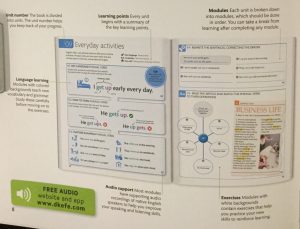
Unit number The book is divided into units. The unit number helps you keep track of your progress.
Learning points Every unit begins with a summary of the key learning points.
Modules Each unit is broken down into modules, which should be done in order. You can take a break from learning after completing any module.
Language learning Modules with colored backgrounds teach new vocabulary and grammar.
Study these carefully before moving on to the exercises.
Audio support Most modules have supporting audio recordings of native English speakers to help you improve your speaking and listening skills.
Exercises Modules with white backgrounds contain exercises that help you practice your new skills to reinforce learning.
FREE AUDIO
website and app
www.dkefe.com
Language modules
New language points are taught in carefully graded stages, starting with a simple explanation of when they are used, then offering further examples of common usage and a detailed breakdown of how key constructions are formed.
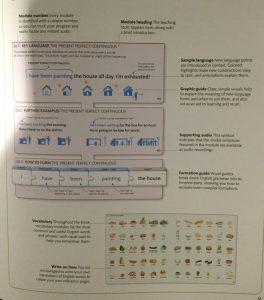
Module number Every module is identified with a unique number, so you can track your progress and easily locate any related audio.
Module heading The teaching topic appears here, along with a brief introduction.
Sample language New language points are introduced in context. Colored highlights make new constructions easy to spot, and annotations explain them.
Graphic guide Clear, simple visuals help to explain the meaning of new language forms and when to use them, and also act as an aid to learning and recall.
Supporting audio This symbol indicates that the model sentences featured in the module are available as audio recordings.
Formation guide Visual guides break down English grammar into its simplest parts, showing you how to recreate even complex formations.
Vocabulary Throughout the book, vocabulary modules list the most common and useful English words and phrases, with visual cues to help you remember them.
Write-on lines You are encouraged to write your own translations of English words to create your own reference pages.
Practice modules
Each exercise is carefully graded to drill and test the language taught in the corresponding course book units. Working through the exercises alongside the course book will help you remember what you have learned and become more fluent. Every exercise is introduced with a symbol to indicate which skill is being practiced.
GRAMMAR Apply new language rules in different contexts.
VOCABULARY Cement your understanding of key vocabulary.
SPEAKING Compare your spoken English to model audio recordings.
READING Examine target language in real-life English contexts.
LISTENING Test your understanding of spoken English
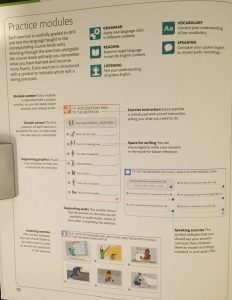
Module number Every module is identified with a unique number, so you can easily locate answers and related audio.
Exercise instruction Every exercise is introduced with a brief instruction, telling you what you need to do.
Sample answer the first question of each exercise is answered for you, to help make the task easy to understand.
Space for writing You are encouraged to write your answers in the book for future reference.
Supporting graphics Visual cues are given to help you understand the exercises.
Supporting audio This symbol shows that the answers to the exercise are available as audio tracks. Listen to them after completing the exercise.
Listening exercise This symbol indicates that you should listen to an audio track in order to answer the questions in the exercise.
Speaking exercise This symbol indicates that you should say your answers out loud, then compare them to model recordings included in your audio files.
Audio
English for Everyone features extensive supporting audio materials. You are encouraged to use them as much as you can, to improve your understanding of spoken English, and to make your own accent and pronunciation more natural. Each file can be played, paused, and repeated as often as you like, until you are confident you understand what has been said.
LISTENING EXERCISES This symbol indicates that you should listen to an audio track in order to answer the questions in the exercise.
SUPPORTING AUDIO This symbol indicates that extra audio material is available for you to listen to after completing the module.
FREE AUDIO website and app www.dkefe.com
Track your progress
The course is designed to make it easy to monitor your progress, with regular summary and review modules. Answers are provided for every exercise, so you can see how well you have understood each teaching point.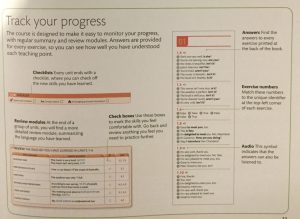
Checklists Every unit ends with a checklist, where you can check off the new skills you have learned.
Review modules At the end of a group of units, you will find a more detailed review module, summarizing the language you have learned.
Check boxes Use these boxes to mark the skills you feel comfortable with. Go back and review anything you feel you need to practice further.
Answers Find the answers to every exercise printed at the back of the book.
Exercise numbers Match these numbers to the unique identifier at the top-left corner of each exercise.
Audio This symbol indicates that the answers can also be listened to.

